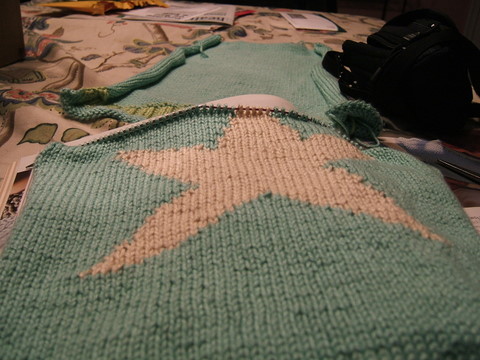Confessions of a Mommy Scientist
Ms. Glampyre's recent posts, and my own situation of being almost, but not quite out the door have got me thinking a little about why its so damn hard for women with children in science.
A while back I read a blurb (I think at Salon, but maybe at Wash. Post, I don't remember) about how the statistics don't reveal any trend in women with higher degrees dropping out of the work force to raise their children. The piece was horribly written, and the analysis of the statistics was flat out wrong and ill thought out. The authors thesis was that if you look at the population of stay-at home mom's most have a high school education at most, and it is their lack of good choices and opportunity that leads to women becoming stay-at home mom's. The author might want to have considered that it is only a smallish subset of women in the general public who hold advanced degree, thus you wouldn't expect them to make up a big part of the stay-at home population, but this is neither here nor there. Anyway it was that thing about choices that got me thinking.
Simply put, I think that one of the reason's women with children have such a hard time making their scientific career's go beyond motherhood, is a lack of good choices. There aren't part-time scientist jobs. There isn't even an 80% option. Mid level, non PI, non grant writing, researcher positions are hard to come by, and from the talk I here at my former work, getting scarcer. It's all or none. And to do the all part and sustain it over a long career, even if you don't have children means you have to be very passionate about it. And if you do have children and are the primary caregiver........
The reason women with children lack good options, is that they are really starting their career in earnest right around the time they have children. In most other career paths by your early thirties you have a job and have established yourself somewhat. Not being established means they have little good negotiating power. It's hard to get someone to hire you in your first real position if you want to work 80%, especially when there are at least ten other good candidates who don't.
That brings me to the cold hard truth. We train way too many scientists for them all to have viable careers (especially in academic circles). Yes, we let them put their ten years in as graduate student and post-doc, paying them little, and taking advantage of their brain power (graduate students and post-docs are the engines that make science roll forward), and then we expect a lot of them to not make it as scientists. And this selection process hits women with children especially hard. Afterall we aren't stupid. Who would want that kind of crazy? Only people who are incredibly passionate about what they do.
Don't get me wrong there are women who make it work, and have done a great job with both motherhood and science. Then there are the horror stories, couple living apart, children raised by nannies (a notion most American women dislike), divorces, mental breakdowns. So knowing when to quit and what your priorities are is important.
Do I have answers? Mid level positions can help women. Real jobs sooner would help women. More flexible career trajectory would help women. More understanding about flexible career trajectory would help women.
Advice? Plan babies for natural breaks (end of grad school, end of post-doc), and take a year off. My first year back was hell and I had an extremely understanding boss. Marry a non-scientist, with non-scientist income. Don't be afraid to hire a nanny if you can afford it. I did traditional centered based daycare and the drop up and pick off added a lot of stress to my routine. In hind site a nanny would have better if a could get over that darn problem I have with hiring someone to work for me at home full time and paying them so little to do it. Study something where there isn't as much competition, but is still interesting (I stole this from a elder successful mommy scientist, could be rephrased choose your project and mentor wisely). Don't be afraid of the notion that you can't come back. I think this may be more perception than reality. Not many women attempt, so people aren't used to the idea. I think (at least in Biological fields) it's possible. I'm not saying it wouldn't be damn hard, but so is having a career in the first place. And I think the more women try to do this, the more likely it will be an acceptable practice. Think outside the box in terms of career; volunteering might be a good way to keep in practice or come back if you can afford it. And keep in mind you scientific training can apparently translate into all sorts of careers (at least that's what "they" say....)
Most importantly however, if you want to have a baby do it and figure out the rest. It will fall in line somehow. We don't have forever to have babies. It is just a chapter in our lives. It passes, and you won't get a second chance to write it. If you want a baby go for it. I also say this, because as you get into your mid-thirties you'll find things can start happening. Your parents start having medical problems, and mid thirties is prime time for center types of cancer to start showing up in women, and also the start of when autoimmune issues start cropping up. In other words don't wait until the last minute to have the baby you always wanted. You never know what might happen to interfere with you plans.
Having children is very challenging with two working parents no matter what their careers. Science might be particularly challenging because we build it up to be so much more than a career, but it's not. (well I guess for some it is more, but well nevermind)
Maybe women drop out of science permenantly because once you really leave that envirnoment, it's like clouds part and you suddenly can see the sun peeking through. I've been having a great time with my son, and I'm more busy than you could ever imagine. Maybe women don't come back to the bench because once they leave they realize there is a whole world out there they've been missing, that they can contribute to in a meaningful way, and suddenly they don't want to go back !

No comments:
Post a Comment